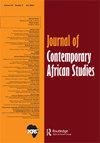South Africa’s black middle classes between 2009 and 2018
IF 0.8
Q2 AREA STUDIES
引用次数: 0
Abstract
ABSTRACT This article considers the social and political action of South Africa's black middle classes during the Jacob Zuma administration (2009 and 2018) during which the governing party fragmented in a disorderly way, partly dissolving traditional class lines. Swathes of black middle classes left the governing party to join the militant Economic Freedom Fighters, new smaller parties and the main opposition party (the Democratic Alliance). The class-based fallout was consequential for the governing party, as it was for theories of middle classes. Using South Africa's experience, this article offers a critique of the dominant neoliberal tradition which imagines an orderly and politically homogeneous class. It further argues that social and political action among the black middle classes should not be viewed as generic, it is rather shaped by dynamics unique to South Africa, including social memory. This, it is argued, blurs class behaviour as articulated by prevailing class theories.2009年至2018年间南非的黑人中产阶级
摘要本文考察了南非黑人中产阶级在雅各布·祖马执政期间(2009年和2018年)的社会和政治行动,执政党以无序的方式分裂,部分瓦解了传统的阶级路线。大批黑人中产阶级离开执政党,加入激进的经济自由斗士、新的较小政党和主要反对党(民主联盟)。基于阶级的影响对执政党和中产阶级理论都有影响。利用南非的经验,本文对占主导地位的新自由主义传统进行了批判,该传统设想了一个有序且政治同质的阶级。它进一步认为,黑人中产阶级的社会和政治行动不应被视为一般性的,而是由南非特有的动态形成的,包括社会记忆。有人认为,这模糊了主流阶级理论所阐述的阶级行为。
本文章由计算机程序翻译,如有差异,请以英文原文为准。
求助全文
约1分钟内获得全文
求助全文
来源期刊

Journal of Contemporary African Studies
AREA STUDIES-
CiteScore
2.20
自引率
0.00%
发文量
18
期刊介绍:
Journal of Contemporary African Studies (JCAS) is an interdisciplinary journal seeking to promote an African-centred scholarly understanding of societies on the continent and their location within the global political economy. Its scope extends across a wide range of social science and humanities disciplines with topics covered including, but not limited to, culture, development, education, environmental questions, gender, government, labour, land, leadership, political economy politics, social movements, sociology of knowledge and welfare. JCAS welcomes contributions reviewing general trends in the academic literature with a specific focus on debates and developments in Africa as part of a broader aim of contributing towards the development of viable communities of African scholarship. The journal publishes original research articles, book reviews, notes from the field, debates, research reports and occasional review essays. It also publishes special issues and welcomes proposals for new topics. JCAS is published four times a year, in January, April, July and October.
 求助内容:
求助内容: 应助结果提醒方式:
应助结果提醒方式:


